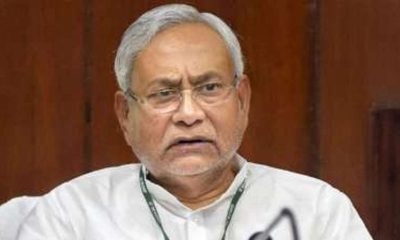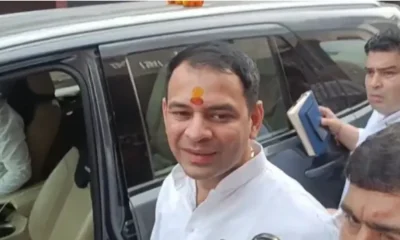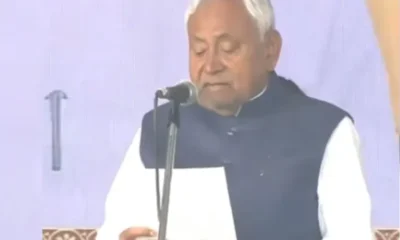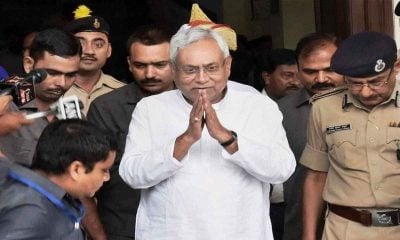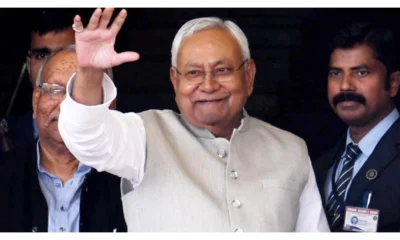[vc_row][vc_column][vc_column_text]
Bihar chief minister Nitish Kumar’s faction of the JD (U) had demanded the disqualification; Sharad Yadav says he will continue fight to save democracy
In a haste rarely seen in decisions taken by the Rajya Sabha secretariat when it comes to demands for expulsion of members of Parliament’s Upper House, Chairman Venkaiah Naidu, on Monday evening, disqualified rebel Janata Dal (United) MPs, Sharad Yadav and Ali Anwar from the Rajya Sabha.
The move by Naidu, who as Vice President is the ex-officio chairman of the Rajya Sabha, comes three months after Bihar chief minister Nitish Kumar’s faction wrote to him demanding that Rajya Sabha memberships of rebel leaders, Sharad Yadav and Ali Anwar, be terminated.
On Tuesday, Yadav and several other Opposition leaders slammed Naidu’s decision to disqualify the two veteran parliamentarians without even giving them a chance to reply to a notice that over the imminent decision that was reportedly served to them from the Rajya Sabha secretariat only hours before the remainder of their Upper House tenures were terminated.
In a brief response to news agency IANS, Sharad Yadav had confirmed that a 15-page notice on his disqualification was served to him at his Delhi residence “late on Monday night” and that he had hoped to go through the notice on Tuesday before sending his reply to the Rajya Sabha secretariat. However, he was informed that his membership of the Rajya Sabha had been terminated with immediate effect.
On Tuesday, before he left for Gujarat to campaign for his faction of the JD (U), which is fighting the upcoming Assembly polls against the BJP on seven of the state’s 182 seats under the banner of Bharatiya Rashtriya Tribal Party, Sharad Yadav asserted that he would “continue to fight to save democracy”.
Yadav and Anwar’s expulsion from the Rajya Sabha comes as the result of their opposition to JD (U) chief and Bihar chief minister Nitish Kumar’s decision of dumping the party’s ‘Mahagathbandhan’ with Lalu Prasad Yadav’s RJD and the Congress and instead forming a ruling coalition with the BJP earlier this year. The Mahagathbandhan was a pre-poll alliance between the JD (U), RJD and Congress that had been stitched together by Lalu Prasad, Nitish Kumar, Sharad Yadav and the Congress leadership in a bid to stop the BJP’s victory march at the hustings under Prime Minister Narendra Modi and party president Amit Shah’s leadership.
However, after allegations of corruption were raised against Lalu Prasad’s son and Bihar deputy chief minister Tejashwi in August this year, Nitish had stunned and political observers and his party colleagues like Sharad Yadav by first announcing that he was resigning as chief minister and then – within 24 hours – returning to office with the BJP as part of his new ruling coalition. Yadav and Ali Anwar had declared Nitish’s decision as a “betrayal of the mandate given to the Mahagathbandhan by the people of Bihar” and vowed to fight against the chief minister’s autocratic style of functioning.
On Tuesday, following his disqualification from the Rajya Sabha, Sharad Yadav took to Twitter to assert that he will continue his protest against Nitish Kumar’s betrayal.
[/vc_column_text][vc_raw_html]JTNDYmxvY2txdW90ZSUyMGNsYXNzJTNEJTIydHdpdHRlci10d2VldCUyMiUyMGRhdGEtbGFuZyUzRCUyMmVuJTIyJTNFJTNDcCUyMGxhbmclM0QlMjJlbiUyMiUyMGRpciUzRCUyMmx0ciUyMiUzRUklMjBhbSUyMGRpc3F1YWxpZmllZCUyMGZyb20lMjBSYWp5YSUyMFNhYmhhJTIwYXMlMjBNYWhhZ2F0aGJhbmRhbiUyMHdoaWNoJTIwd2FzJTIwZm9ybWVkJTIwdG8lMjBkZWZlYXQlMjBOREElMjBpbiUyMEJpaGFyJTIwJTI2YW1wJTNCJTIwYWZ0ZXIlMjAxOCUyMG1vbnRocyUyMHRvJTIwYnJlYWslMjBpdCUyMCUyNmFtcCUzQiUyMGpvaW5pbmclMjBOREElMjB0byUyMHJlbWFpbiUyMGluJTIwcG93ZXIlMjAlMjZhbXAlM0IlMjBpZiUyMHRvJTIwc3BlYWslMjBhZ2FpbnN0JTIwdGhpcyUyMHVuZGVtb2NyYXRpYyUyMHN0eWxlJTIwaXMlMjBteSUyMGZhdWx0JTIwSSUyMHdpbGwlMjBjb250aW51ZSUyMHRvJTIwZmlnaHQlMjB0byUyMHNhdmUlMjBkZW1vY3JhY3kuJTNDJTJGcCUzRSUyNm1kYXNoJTNCJTIwU0hBUkFEJTIwWUFEQVYlMjAlMjglNDBTaGFyYWRZYWRhdk1QJTI5JTIwJTNDYSUyMGhyZWYlM0QlMjJodHRwcyUzQSUyRiUyRnR3aXR0ZXIuY29tJTJGU2hhcmFkWWFkYXZNUCUyRnN0YXR1cyUyRjkzNzg5ODI5MDMyMTgyMTcwMiUzRnJlZl9zcmMlM0R0d3NyYyUyNTVFdGZ3JTIyJTNFRGVjZW1iZXIlMjA1JTJDJTIwMjAxNyUzQyUyRmElM0UlM0MlMkZibG9ja3F1b3RlJTNFJTBBJTBBJTNDc2NyaXB0JTIwYXN5bmMlMjBzcmMlM0QlMjJodHRwcyUzQSUyRiUyRnBsYXRmb3JtLnR3aXR0ZXIuY29tJTJGd2lkZ2V0cy5qcyUyMiUyMGNoYXJzZXQlM0QlMjJ1dGYtOCUyMiUzRSUzQyUyRnNjcmlwdCUzRSUwQSUwQSUyMCUwQSUwQSUzQ2Jsb2NrcXVvdGUlMjBjbGFzcyUzRCUyMnR3aXR0ZXItdHdlZXQlMjIlMjBkYXRhLWxhbmclM0QlMjJlbiUyMiUzRSUzQ3AlMjBsYW5nJTNEJTIyZW4lMjIlMjBkaXIlM0QlMjJsdHIlMjIlM0VJZiUyMEklMjBhbSUyMGRpc3F1YWxpZmllZCUyMGZyb20lMjBSYWp5YSUyMFNhYmhhJTIwYmVjYXVzZSUyMEklMjByZXNwZWN0JTIwZGVtb2NyYXRpYyUyMHZhbHVlcyUyQyUyMGZvbGxvdyUyMGQlMjBwYXJ0eSUyMGNvbnN0aXR1dGlvbiUyMCUyNmFtcCUzQiUyMHJlc3BlY3QlMjBkJTIwbWFuZGF0ZSUyMGdpdmVuJTIwYnklMjAxMSUyMGNyb3JlJTIwcGVvcGxlJTIwb2YlMjBCaWhhciUyMGZvciUyME1haGFnYXRoYmFuZGFuJTIwdGhlbiUyMEklMjB3aWxsJTIwY29udGludWUlMjB0byUyMGRvJTIwc28lMjBub3QlMjBvbmx5JTIwZm9yJTIwZCUyMHBlb3BsZSUyMG9mJTIwQmloYXIlMjBidXQlMjBkJTIwY291bnRyeSUyMGFzJTIwYSUyMHdob2xlLiUzQyUyRnAlM0UlMjZtZGFzaCUzQiUyMFNIQVJBRCUyMFlBREFWJTIwJTI4JTQwU2hhcmFkWWFkYXZNUCUyOSUyMCUzQ2ElMjBocmVmJTNEJTIyaHR0cHMlM0ElMkYlMkZ0d2l0dGVyLmNvbSUyRlNoYXJhZFlhZGF2TVAlMkZzdGF0dXMlMkY5Mzc5NTIwNzg2Njc3OTIzODUlM0ZyZWZfc3JjJTNEdHdzcmMlMjU1RXRmdyUyMiUzRURlY2VtYmVyJTIwNSUyQyUyMDIwMTclM0MlMkZhJTNFJTNDJTJGYmxvY2txdW90ZSUzRSUwQSUwQSUzQ3NjcmlwdCUyMGFzeW5jJTIwc3JjJTNEJTIyaHR0cHMlM0ElMkYlMkZwbGF0Zm9ybS50d2l0dGVyLmNvbSUyRndpZGdldHMuanMlMjIlMjBjaGFyc2V0JTNEJTIydXRmLTglMjIlM0UlM0MlMkZzY3JpcHQlM0U=[/vc_raw_html][vc_column_text]Former Rajya Sabha MP and CPI (M) general secretary Sitaram Yechury said that the haste shown by Venkaiah Naidu in deciding on the petition seeking Yadav and Anwar’s disqualification had “cast a shadow” and that similar petitions demanding disqualifications of some MPs from the Lok Sabha had been “pending for over a year”.[/vc_column_text][vc_raw_html]JTNDYmxvY2txdW90ZSUyMGNsYXNzJTNEJTIydHdpdHRlci10d2VldCUyMiUyMGRhdGEtbGFuZyUzRCUyMmVuJTIyJTNFJTNDcCUyMGxhbmclM0QlMjJlbiUyMiUyMGRpciUzRCUyMmx0ciUyMiUzRUxpa2UlMjBDZWFzYXIlMjYlMjMzOSUzQnMlMjB3aWZlJTJDJTIwdGhlJTIwUmFqeWElMjBTYWJoYSUyMENoYWlybWFuJTI2JTIzMzklM0JzJTIwZGVjaXNpb25zJTIwbXVzdCUyMGJlJTIwYWJvdmUlMjBxdWVzdGlvbmluZy4lMjBCdXQlMjAlM0NiciUzRXRoZSUyMGRpc3F1YWxpZmljYXRpb24lMjBvZiUyMFJhanlhJTIwU2FiaGElMjBNUHMlMjBTaGFyYWQlMjBZYWRhdiUyMGFuZCUyMEFsaSUyMEFud2VyJTIwY2FzdHMlMjBhJTIwc2hhZG93LiUzQyUyRnAlM0UlMjZtZGFzaCUzQiUyMFNpdGFyYW0lMjBZZWNodXJ5JTIwJTI4JTQwU2l0YXJhbVllY2h1cnklMjklMjAlM0NhJTIwaHJlZiUzRCUyMmh0dHBzJTNBJTJGJTJGdHdpdHRlci5jb20lMkZTaXRhcmFtWWVjaHVyeSUyRnN0YXR1cyUyRjkzNzg5NTQ2ODk1MTk5MDI3MyUzRnJlZl9zcmMlM0R0d3NyYyUyNTVFdGZ3JTIyJTNFRGVjZW1iZXIlMjA1JTJDJTIwMjAxNyUzQyUyRmElM0UlM0MlMkZibG9ja3F1b3RlJTNFJTBBJTBBJTNDc2NyaXB0JTIwYXN5bmMlMjBzcmMlM0QlMjJodHRwcyUzQSUyRiUyRnBsYXRmb3JtLnR3aXR0ZXIuY29tJTJGd2lkZ2V0cy5qcyUyMiUyMGNoYXJzZXQlM0QlMjJ1dGYtOCUyMiUzRSUzQyUyRnNjcmlwdCUzRSUwQSUwQSUyMCUwQSUwQSUzQ2Jsb2NrcXVvdGUlMjBjbGFzcyUzRCUyMnR3aXR0ZXItdHdlZXQlMjIlMjBkYXRhLWNvbnZlcnNhdGlvbiUzRCUyMm5vbmUlMjIlMjBkYXRhLWxhbmclM0QlMjJlbiUyMiUzRSUzQ3AlMjBsYW5nJTNEJTIyZW4lMjIlMjBkaXIlM0QlMjJsdHIlMjIlM0VUaGUlMjBwZXRpdGlvbiUyMHdhcyUyMGZpbGVkJTIwb24lMjBTZXB0ZW1iZXIlMjAyJTIwYW5kJTIwdGhlJTIwZGVjaXNpb24lMjBpcyUyMG91dCUyMG9uJTIwRGVjZW1iZXIlMjA0LiUyMFRoZSUyMHNwZWVkJTIwaXMlMjBtaW5kLWJvZ2dsaW5nLiUyMFNpbWlsYXIlMjBjYXNlcyUyMGFyZSUyMHBlbmRpbmclMjBpbiUyMExvayUyMFNhYmhhJTIwZm9yJTIwb3ZlciUyMGElMjB5ZWFyLiUyMFNvJTIwcG9saXRpY2FsJTIwYWZmaWxpYXRpb24lMjBpcyUyMHRoZSUyMG9ubHklMjB0aGluZyUyMHRoYXQlMjBtYXR0ZXJzJTNGJTNDJTJGcCUzRSUyNm1kYXNoJTNCJTIwU2l0YXJhbSUyMFllY2h1cnklMjAlMjglNDBTaXRhcmFtWWVjaHVyeSUyOSUyMCUzQ2ElMjBocmVmJTNEJTIyaHR0cHMlM0ElMkYlMkZ0d2l0dGVyLmNvbSUyRlNpdGFyYW1ZZWNodXJ5JTJGc3RhdHVzJTJGOTM3ODk1NTY3ODYyMTk0MTc4JTNGcmVmX3NyYyUzRHR3c3JjJTI1NUV0ZnclMjIlM0VEZWNlbWJlciUyMDUlMkMlMjAyMDE3JTNDJTJGYSUzRSUzQyUyRmJsb2NrcXVvdGUlM0UlMEElMEElM0NzY3JpcHQlMjBhc3luYyUyMHNyYyUzRCUyMmh0dHBzJTNBJTJGJTJGcGxhdGZvcm0udHdpdHRlci5jb20lMkZ3aWRnZXRzLmpzJTIyJTIwY2hhcnNldCUzRCUyMnV0Zi04JTIyJTNFJTNDJTJGc2NyaXB0JTNF[/vc_raw_html][vc_column_text]Sources said that senior Congress MP in the Rajya Sabha,, Anand Sharma along with some other Opposition members had Rajya Sabha chairman Venkaiah Naidu to refer the petition seeking disqualification of Sharad Yadav and Ali Anwar to a parliamentary committee. However, Naidu reportedly rejected the request claiming that that in previous cases parliamentary committees had made little contribution, and instead delayed their decision.[/vc_column_text][/vc_column][/vc_row]
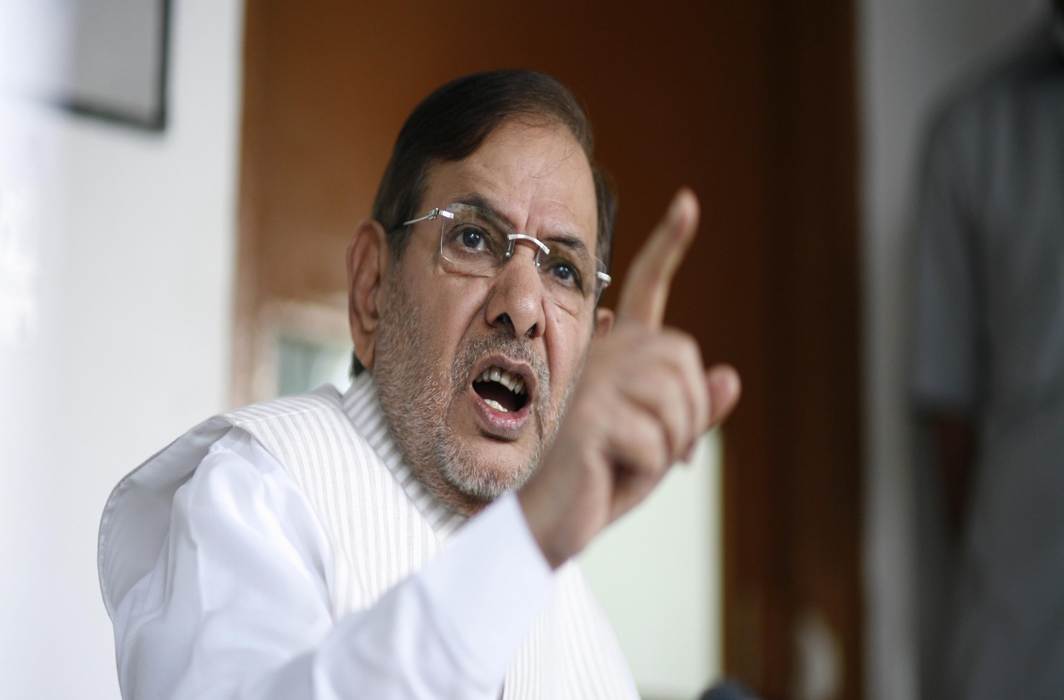

 India News17 hours ago
India News17 hours ago
 Latest world news17 hours ago
Latest world news17 hours ago
 Latest world news3 hours ago
Latest world news3 hours ago
 Latest world news3 hours ago
Latest world news3 hours ago
 India News3 hours ago
India News3 hours ago
 Latest world news2 hours ago
Latest world news2 hours ago
 India News2 hours ago
India News2 hours ago


